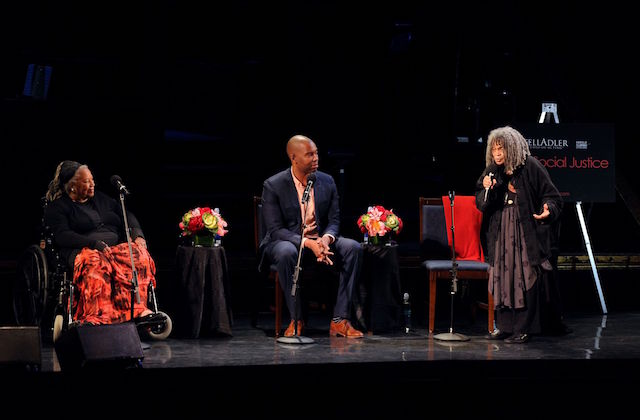Three literary giants, representing nearly a half-century of racial justice-concerned literature between them, sat down Wednesday night (June 15) for an epic conversation on art and social change.
Sonia Sanchez, Toni Morrison and Ta-Nehisi Coates appeared at New York City’s Ambassador Theatre for "Arts and Social Justice," an event presented by the Stella Adler Studio of Acting. Each writer also received the studio’s Marlon Brando Award in honor of their joint artistic and social justice commmittments.
The authors addressed several topics, including the Pulse massacre and police brutality. In absence of video (besides this one of Morrison’s final remarks), Vox compiled some of each writer’s statements.
Coates invoked both Pulse and Ferguson when talking about analyses of events rooted in racism:
When something catastrophic happens, we like to analyze it at the point of conflict. Take Orlando right now. What we’re saying is, "assault weapons ban"; that’s where we’re at right now. Things that really are insufficient measures to correct the problem begin to seem like radical steps. An assault weapons ban would not be enough; it wouldn’t even be close to enough.
In a situation like Ferguson, you get bogged down into this place: What happened with the officer and Mike Brown? And all of the analysis happens right there. None of the analysis goes into, what is the relationship between the police department, historically, and this community? Why are the cops there in the first place? Why are folks so hostile to the police in the first place?… We’re so bogged down in the initial confrontations because they seem so exciting, they seem so shocking.
Sanchez, who moderated the conversation, offered a perspective on Muhammad Ali‘s appeal:
I would never watch boxing. I was a baseball fan. But my father said to me one night, "You must watch Sugar Ray Robinson. He’s an artist. He’s not just hitting people. He dances, he moves. You like that poetry. He’s like a poet in the ring." So I sat down and I would watch Sugar Ray fight. And then along comes Muhammad Ali, and I said, "I don’t watch boxing, it’s cruel." And my father said to me, "You need to watch Muhammad Ali, because he’s like Sugar Ray Robinson. He is this dancer. He is this poet. He is clever. He’s a clever boxer." And so I watched him and fell in love with him, what he did. Because, you see, not only was he boxing for himself, he was boxing for all of us.
Morrison closed by talking about the danger many artists faced—and still face—to speak truth to power:
I want to remind us all that art is dangerous. I want to remind you of the history of artists who have been murdered, slaughtered, imprisoned, chopped up, refused entrance. The history of art, whether it’s in music or written or what have you, has always been bloody, because dictators and people in office and people who want to control and deceive know exactly the people who will disturb their plans.
And those people are artists. They’re the ones that sing the truth. And that is something that society has got to protect. But when you enter that field, no matter whether that’s Sonia’s poetry or Ta-Nehisi’s rather startlingly clear prose, it’s a dangerous pursuit. Somebody’s out to get you. You have to know it before you start, and do it under those circumstances, because it is one of the most important things that human beings do.
